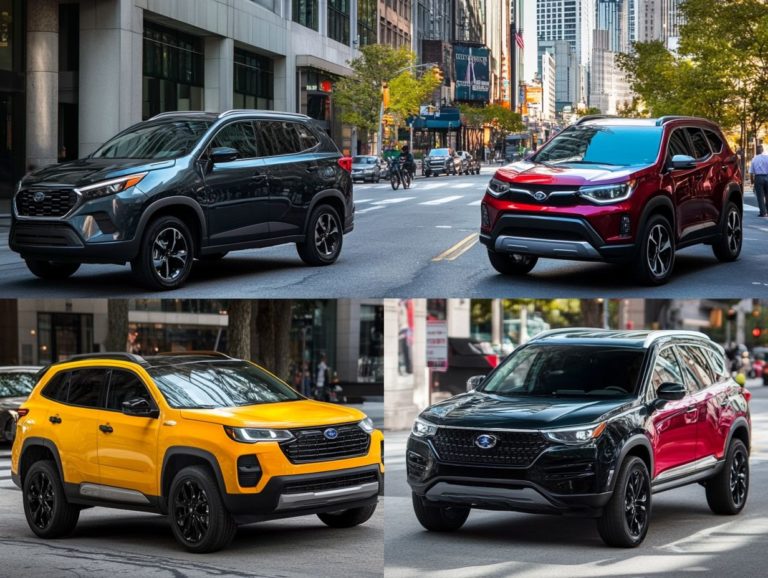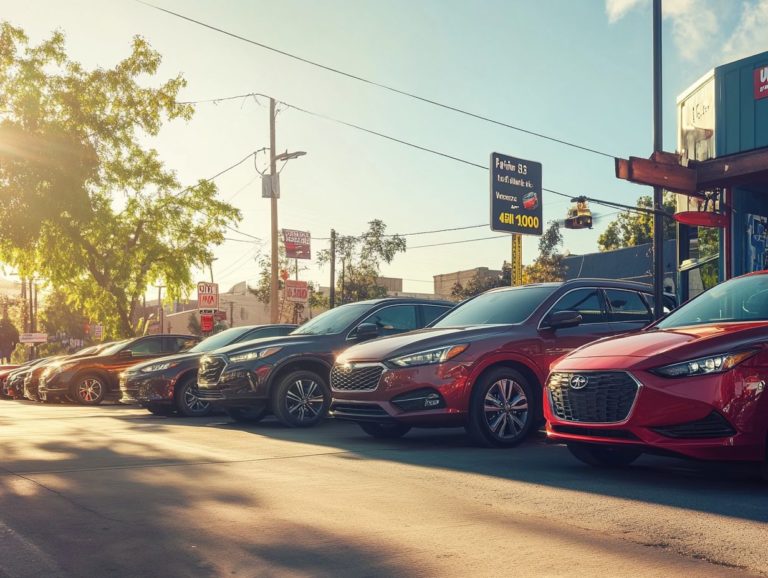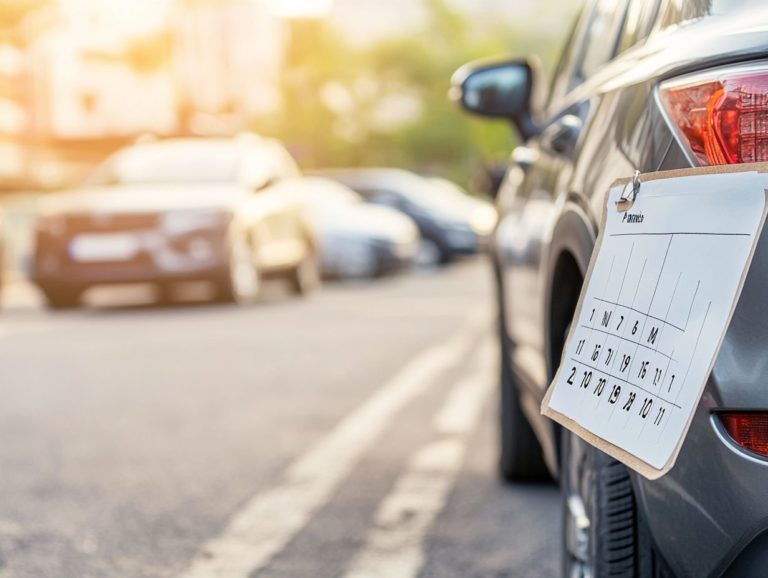5 Things to Consider Before Buying Used
Buying used items can be a savvy way to save money, but it comes with a unique set of challenges.
From ensuring the condition of the item to evaluating the seller’s reputation, every factor is crucial for making a wise purchase. This article outlines essential considerations, including price, return policies, and potential hidden issues, to help you navigate the process with confidence.
Whether you re on the hunt for electronics, furniture, or anything in between, grasping these key aspects can lead to a rewarding buying experience.
Contents
- Key Takeaways:
- 1. Assessing the Condition of the Car
- 2. Understanding the Seller’s Reputation and History
- 3. The Price and Potential Savings
- 4. The Return Policy
- 5. The Availability of Spare Parts and Repair Services
- 6. The Age and Model of the Item
- 7. The Purpose and Frequency of Use
- 8. The Location and Transportation Costs
- 9. The Warranty and Guarantee
- 10. The Compatibility with Other Devices or Systems
- 11. The Potential for Hidden Damage or Issues
- 12. The Safety and Quality Standards
- 13. The Reputation of the Brand
- 14. The Availability of Reviews or Feedback
- 15. The Overall Cost-Comparison
- Frequently Asked Questions
Key Takeaways:

- Check the item’s condition before buying to avoid future headaches.
- Research the seller’s history for a smoother buying experience.
- Weigh both the price and savings to make sure you get the best deal.
1. Assessing the Condition of the Car
The condition of a used car is crucial when you’re contemplating a purchase, as it directly impacts reliability, safety, and overall value. To make an informed decision, consider these 5 tips for buying a used luxury car.
A thorough assessment involves looking at a vehicle history report, which is a document that shows a car’s past accidents and services, confirming the car has received proper maintenance, and carefully checking its engine condition and mileage to determine how much life is left in the vehicle.
Choosing certified pre-owned vehicles can offer you extra peace of mind. These cars typically undergo rigorous inspections and come with warranties, ensuring their quality and dependability for years to come.
Interpreting the vehicle history report accurately is essential; it reveals any prior accidents, title issues, or service intervals that could influence the car s longevity. If you’re considering a pre-purchase inspection, enlisting a trusted mechanic can help uncover hidden problems that might not be immediately obvious.
Maintenance records are also vital, revealing how the car has been treated over time. This information provides insight into whether it has received the standard care necessary to keep it running effectively.
By choosing certified pre-owned vehicles, you not only ensure a higher quality standard but also gain benefits like roadside assistance and a more comprehensive vehicle warranty than what you’d typically find with traditional used cars.
2. Understanding the Seller’s Reputation and History
Knowing the seller’s reputation and history is essential when navigating the used car market, as it can have a significant impact on your buying experience.
A reputable car dealer usually has positive reviews and consumer reports that attest to their reliability. Resources like U.S. News and World Report and Car Complaints provide invaluable insights into various dealers’ histories and customer satisfaction ratings.
Exploring consumer feedback is imperative for anyone aiming to make a smart investment. It reveals not just the quality of the vehicles sold, but also how effectively the seller addresses customer concerns. Platforms like Yelp and Google Reviews offer firsthand accounts from past buyers, giving you a glimpse into the overall purchasing experience.
By analyzing ratings and reviews, you can identify trends in a dealer’s service, pinpointing those with a solid track record. Ultimately, choosing to work with a trustworthy seller increases your chances of acquiring a reliable vehicle and grants you peace of mind throughout the transaction.
Don t miss out! Start your search for used items with confidence today!
3. The Price and Potential Savings
Evaluating the price of a used car is crucial for making a smart investment. Understanding market pricing and fair market value can help you save money. It s vital to compare similar models and their features to see if the asking price matches the average car payments for that vehicle.
This approach will allow you to explore financing options that align with your budget.
To effectively assess market pricing, utilize resources like Kelley Blue Book and NADAGuides. These tools offer invaluable insights, enabling you to check the vehicle’s history, condition, and regional demand, thereby painting a clearer picture of what fair market value truly is.
In terms of negotiating, armed with data from these resources, you ll be enabled to ask for a fair price based on current market trends. Remember to explore financing options to ease your budget!
4. The Return Policy
The return policy from your car dealer serves as a reassuring safety net when you re in the market for a used car, reflecting the dealer’s confidence in the quality of their vehicles. A flexible return policy not only allows you the freedom to take the car for a spin and assess its performance, but it also minimizes the risk of buyer’s remorse the feeling of regret after a purchase. You ll appreciate having options if the car doesn t quite meet your expectations.
Understanding the nuances of different return policies is essential, as they can vary significantly from one dealer to the next. While some might offer a straightforward 7-day return window, others may provide an extended period for evaluation, which can be a game-changer.
Consider any warranties that may come with the vehicle, as these can play a pivotal role in your decision-making process. Warranties often cover specific repairs or mechanical issues, granting you valuable peace of mind. Make sure to check warranties these could save you money and stress later on!
As you review a return policy, take the time to read the terms and conditions carefully. This will help you comprehend how both the return policy and the warranty work in tandem, ensuring you make a fully informed choice.
5. The Availability of Spare Parts and Repair Services

When you’re on the hunt for a used car, it’s crucial to think about the availability of spare parts and repair services. This can have a significant impact on your long-term automotive expenses. By ensuring you can easily locate parts and qualified technicians, you can avoid unexpected costs and downtime, making it much simpler to keep your vehicle running smoothly over time.
This accessibility not only influences your overall maintenance costs but also plays a pivotal role in the vehicle’s performance and longevity. As a potential buyer, it’s wise to investigate the availability of spare parts for specific makes and models. Dive into online marketplaces, visit local auto shops, or explore forums dedicated to car enthusiasts.
Understanding the repair landscape means you won t find yourself in a tight spot if a component decides to fail unexpectedly. Plus, having access to reliable mechanics who specialize in certain vehicles offers valuable peace of mind. You can rest easy knowing your car will be serviced by experts, ultimately enhancing its reliability and keeping you on the road for years to come.
6. The Age and Model of the Item
The age and model of a used car are vital in assessing its reliability and value. Older models typically have higher mileage and show more signs of wear. Choosing a newer model, especially one that has been inspected and comes with a warranty, can provide assurance of fewer maintenance issues and the latest technologies for a better driving experience.
As you weigh your options, consider your specific needs in relation to your budget. While older cars may tempt you with a lower price tag, they often require more frequent repairs and might lack modern safety features.
In contrast, a certified pre-owned vehicle guarantees a certain quality standard and often includes additional warranties, giving you peace of mind.
Evaluate elements like potential repair costs, insurance rates, and fuel efficiency to identify the choice that best fits your financial constraints and lifestyle. Choose wisely to get a car that is both reliable and offers good value.
7. The Purpose and Frequency of Use
Determining the purpose and frequency of your use for a used car is essential. This decision influences the types of vehicles that best suit your needs and helps manage automotive-related expenses. Whether you’re looking for a reliable vehicle for daily commuting, family outings, or occasional road trips, understanding how often you’ll use the car will guide your decision-making process.
If you have a larger family or enjoy adventurous weekend getaways, an SUV may provide the space and versatility you need. Conversely, if you’re an urban dweller prioritizing fuel efficiency and ease of parking, a sedan might be your ideal match.
Regardless of the vehicle type, delve into the vehicle history report. This document offers insights into previous ownership, accident history, and maintenance records, ensuring the vehicle aligns with your intended usage and anticipated costs. This diligence leads to a more satisfying purchase.
8. The Location and Transportation Costs
The location where you buy a used car significantly impacts not just the initial price, but also ongoing transportation costs especially regarding fuel efficiency and local market pricing. Think about how your daily travel patterns align with the vehicle s fuel consumption, as this will greatly influence your overall expenses.
When weighing your options, consider how different vehicle types be it compact cars, SUVs, or hybrids perform in terms of miles per gallon. Variations in engines and weights can lead to significant differences in fuel consumption, making some models much more economical than others.
Keeping an eye on local gas prices through apps or websites provides a clearer picture of your potential monthly fuel spending. Engaging with community forums or automotive blogs that focus on regional insights can also yield valuable information. Conduct thorough research to ensure your transportation costs remain manageable within your overall automotive budget.
9. The Warranty and Guarantee
A warranty and guarantee can provide significant peace of mind when purchasing a used car. They safeguard you against unforeseen issues that may arise after your purchase. Many certified pre-owned vehicles come with extended warranties covering critical components, adding confidence to your investment.
Understanding the various types of warranties is essential for making an informed decision. Dealer warranties typically cover specific repairs and may vary in duration, while manufacturer warranties are often more comprehensive, covering a broader range of issues for a set mileage or timeframe.
As a prospective buyer, read the fine print to understand what is included, as these warranties protect you from unexpected repair costs. By grasping the details of the coverage, you can navigate your purchase with reduced anxiety, ensuring you re financially prepared for the road ahead.
10. The Compatibility with Other Devices or Systems

Ensuring your used car is compatible with systems like insurance and navigation tools is essential for a smooth driving experience. Checking the vehicle identification number (VIN) is a must. The VIN is a unique code that identifies your car and helps with insurance and understanding the car’s history.
The VIN reveals critical details such as past accidents and service records, which are invaluable for assessing the vehicle s condition. Modern technologies often have specific compatibility needs, and the VIN can help determine if the car meets those requirements.
Some insurance providers offer tailored plans based on the car’s technology package or safety features, which can impact your premium costs. Knowing this can help you make informed decisions about the vehicle’s price and long-term functionality.
11. The Potential for Hidden Damage or Issues
When considering a used car, there are risks due to potential hidden damage or issues. That’s why it’s crucial to check both the vehicle history report and safety ratings. For a more informed purchase, keep in mind 5 tips for buying used cars at a dealership. Finding out about any past accidents or recalls is vital for your safety.
By reviewing the vehicle history report, you can look for red flags like odometer discrepancies or salvage claims, which may indicate serious problems. It’s also important to check safety ratings from reputable organizations; these scores reflect the vehicle’s crash test performance.
Hidden issues like frame damage and electrical problems can lower the car’s value. Being aware of these pitfalls allows you to make informed decisions and save yourself from costly repairs.
12. The Safety and Quality Standards
Safety and quality standards are very important when evaluating a used car. These standards make sure your car is safe to drive and durable. By checking safety ratings and choosing certified pre-owned options, you can trust that the vehicle meets industry benchmarks.
As you assess the vehicle, look for various safety features like anti-lock braking systems, traction control, and advanced airbag deployment. Trustworthy tests from organizations like the National Highway Traffic Safety Administration (NHTSA) provide vital safety ratings that inform you about the model’s crash performance.
Choosing certified pre-owned vehicles gives you peace of mind, knowing that your car has been thoroughly inspected and comes with warranties that enhance both safety and quality. This approach not only improves your driving experience but also adds value to your investment.
13. The Reputation of the Brand
The reputation of a brand is crucial when assessing the reliability of a used car. It directly impacts your confidence in its performance and longevity. Brands known for their reliability often have higher resale values and attract buyers who prioritize dependability. So, it s vital to understand the brand’s standing in the automotive world.
A trusted brand doesn’t just mean quality; it often means fewer repairs and unexpected maintenance costs. This is significant for those who understand that choosing a vehicle with a solid reputation can lead to lower long-term ownership expenses.
Take brands like Toyota and Honda. They consistently receive high marks for reliability, leading many buyers to choose their models with confidence in fewer serious breakdowns. This trust builds customer loyalty and illustrates how a positive reputation creates lasting value that goes beyond the initial purchase.
14. The Availability of Reviews or Feedback
Before diving into your car search, make sure to check out the availability of reviews and feedback on a used vehicle. These insights can significantly shape your purchasing decision, offering valuable information about the car’s performance and owner satisfaction.
Leverage consumer reports and testimonials to ensure you choose a reliable car that not only meets but exceeds your expectations. Exploring various sources like online platforms, automotive publications, and forums provides a well-rounded perspective on the car s history and user experiences.
Make sure to check out both positive and negative reviews, as they collectively present a balanced understanding of what to anticipate. Take note of recurring issues mentioned by different owners; these can be red flags signaling potential problems.
Engaging in conversations with current or former owners can deepen your insight, allowing you to ask questions that might not be addressed in written reviews. Ultimately, a comprehensive analysis arms you with the knowledge necessary to make an informed and confident decision.
15. The Overall Cost-Comparison

Conducting a comprehensive cost comparison is crucial when you’re in the market for a used car. It allows you to weigh the advantages against potential car-related costs that may arise.
Look beyond the initial purchase price and consider ongoing costs such as maintenance, insurance, and financing options. This approach helps you make a well-informed decision that aligns perfectly with your budget.
Include a detailed breakdown of average repair costs in your analysis, as these can vary dramatically depending on the make and model of the vehicle. For example, a used luxury car typically comes with steeper maintenance fees, whereas more economical choices, like a compact sedan, tend to be more budget-friendly.
Also, consider fuel efficiency how far the car goes on a gallon of gas and the cost of parts, as these factors provide insight into long-term expenses. While a used SUV may offer comfort and ample space, it often results in higher fuel bills compared to a hybrid model, thereby affecting your overall savings.
By evaluating these key factors, you can gain a clearer understanding of not just the immediate expenses, but also the financial footprint of the car throughout its lifespan.
Frequently Asked Questions
What are the top 5 things to consider before buying a used vehicle?
1. Budget: Determine your budget and stick to it. Don’t overspend just because the vehicle seems like a good deal. For more guidance, check out these 5 tips for buying a used car from a private seller.
2. Condition: Inspect the vehicle thoroughly for any damages or defects. Make sure it is in good working condition.
3. Reputation of Seller: Research the seller’s reputation, read reviews, and ask for references if buying from an individual.
4. Age of the Vehicle: Consider the age of the vehicle and whether it is still within its usable lifespan. Understanding what to check before buying a used car will help determine its value and potential future repairs or replacements.
5. Warranty or Return Policy: Check if the vehicle comes with a warranty or return policy, especially for electronics. Additionally, consider reviewing 5 tips for buying a used car from a dealer, as this will give you peace of mind and protection in case of any issues.
Can I negotiate the price when buying a used vehicle?
Yes, negotiating the price is common when buying used items. However, be reasonable with your offer and don’t lowball the seller. Consider the vehicle’s condition and market value before making an offer.
What items are best to buy used?
Items that are best to buy used include those with a long lifespan, such as furniture, appliances, and vehicles. These can often be found in good condition at a lower cost than buying new.
What items should I avoid buying used?
It is generally not recommended to buy personal hygiene items, such as mattresses or undergarments, used. Also, avoid buying used items that have a short lifespan, such as cosmetics or perishable food items.
Should I buy from a private seller or a second-hand store?
Both options have their advantages. Private sellers may offer lower prices but may not have a return policy or warranty. Second-hand stores may have slightly higher prices but often provide warranties or return policies for added protection.
How can I ensure the quality of a used item?
Before buying a used item, carefully look it over for damages or defects.
Check for any signs of wear and tear. Don t hesitate to ask the seller for maintenance records or repair history. Knowing the item’s background can give you peace of mind!
Buy from reputable sellers with positive reviews. This way, you ll have a better chance of getting a quality product.






